The Curious Case of Coos County - Ill Advisory

(side note, the font for the Ghost blogging system makes the title look like III and not ill, with that said...)
One of the methods to get things changed is to get measures put on a ballot for an election. According to the SOS Referendum Manual...
The initiative and referendum processes are methods of direct democracy that allow people to propose or amend local laws and charters or to adopt or reject an ordinance or other legislative enactment passed by a local governing body.
There are different levels of measures. Initiatives and referendums can change laws, and so forth, but advisory questions can not.
The Long Route
Normally, for a County-wide measure that changes laws, adds a tax, or creates a referendum, you would need to designate a Chief Petitioner, set up a campaign commission, and get the cover and signature sheets approved. The required number of signatures is a percentage of votes cast for governor in the county in the most recent election where a governor was elected to a full term. For initiatives petitions, a charter amendment needs 8% and all others need 6%. Referendum petitions need 4%.
The November 2020 County election results document shows there were 31,429 votes for Governor. That works out to 2,514, 1,886 and 1,257 signatures, respectively.
This is a shortened version of all the steps necessary for the sake of brevity in this article. All in all, it is a complicated, time consuming, procedure that requires access to large resources to get all these processes completed in a reasonable amount of time. This is not necessarily a bad thing, since it creates a barrier to adding new taxes, laws, or amendments at whim.
Asking For Advice
Another method to get feedback from all the voters is to create an Advisory Measure. Advisory measures only ask questions so that the Commissioners can get public feedback from all the voters. They don't change laws or add taxes. They just ask questions.
As advisory measures they don't need thousands of signatures to get on the ballot, only for two of the three Coos County Commissioners to approve. This method had been used as recently as 2018 in Coos County when an advisory measure regarding marijuana taxation was put on the ballot.
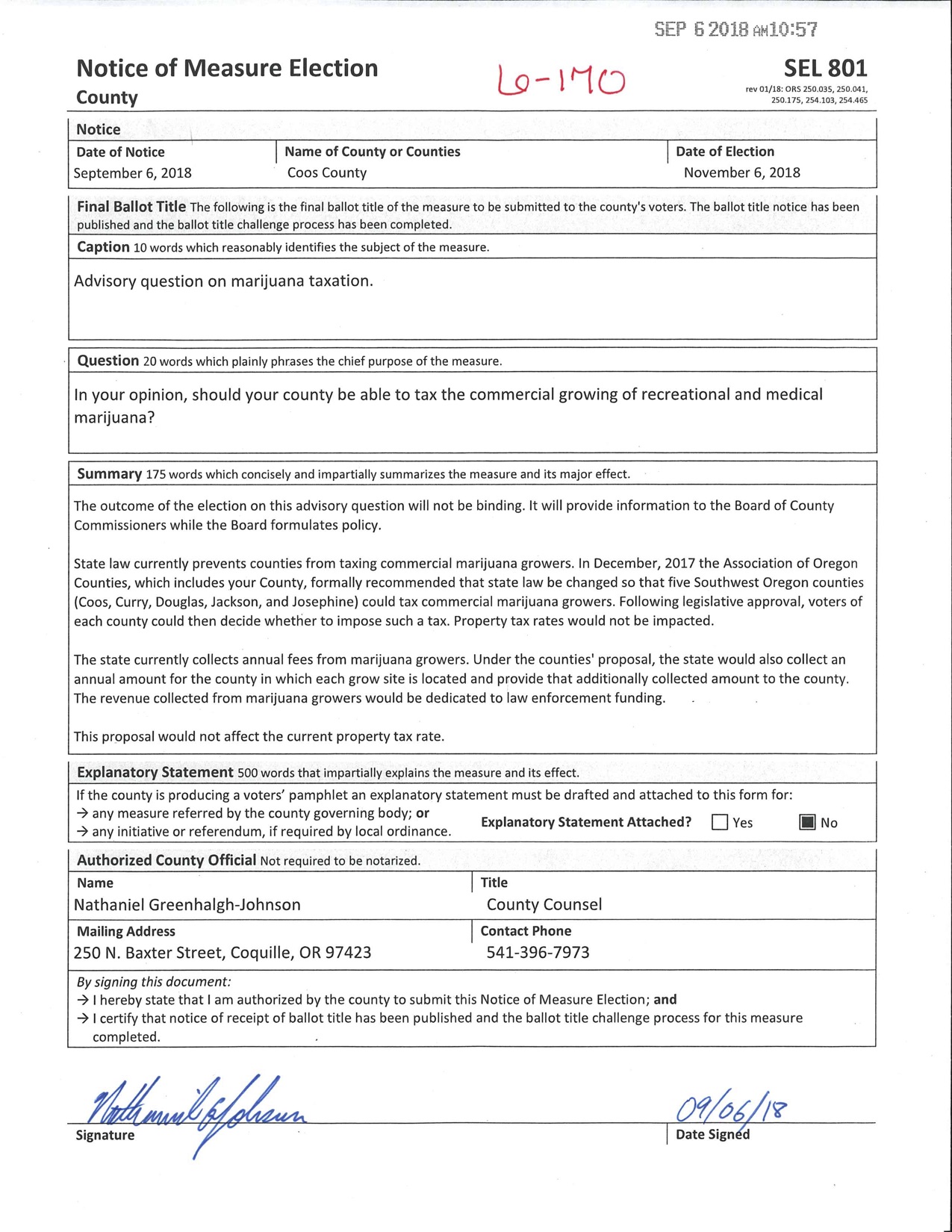
The Original Plan
Initially, there was a plan to put one advisory measure regarding voting integrity on the November 2023 ballot. It turned out that there was no ballot going out for that election since there were no measures or offices up for election. It was considered unwise to do this because it would cost the County roughly $70,000 to mail out ballots to everyone to ask one question. The idea was tabled until the May 2024 Primary Election.
The Second Plan
For the May 2024 Primary there were plans for five advisory measures. Some were done independently. Some were done with the assistance of other Oregon County election integrity groups that had done similar measures. Some were done with the input of two of the three County Commissioners.
The general idea was that since there was a ballot going out for the primaries for various offices in the County and State, asking a number of advisory questions would be a great way to get public sentiment on a number of topics for roughly zero cost. Adding a few questions would only add a trivial amount of time to the ballot composition process.
Making Measurements
The five advisory measures planned, in no particular order, were to cover...
- Election Reform
- Offshore Wind Farms
- School Choice
- Clerk Appointment
- Greater Idaho
There was a sixth advisory measure considered regarding a Sheriff Taxing District, but it was turned into a full ballot measure, 6-213, Coos County Levy measure.
Election Reform
We worked with Commissioner Taylor on the advisory measure to ask about election reforms. We knew that there was no way to change the current Vote By Mail system in place across the state of Oregon, since that would take a state-wide referendum, but we wanted to see what all the voters in Coos County thought would be a preferable system.
Initially it looked like this...
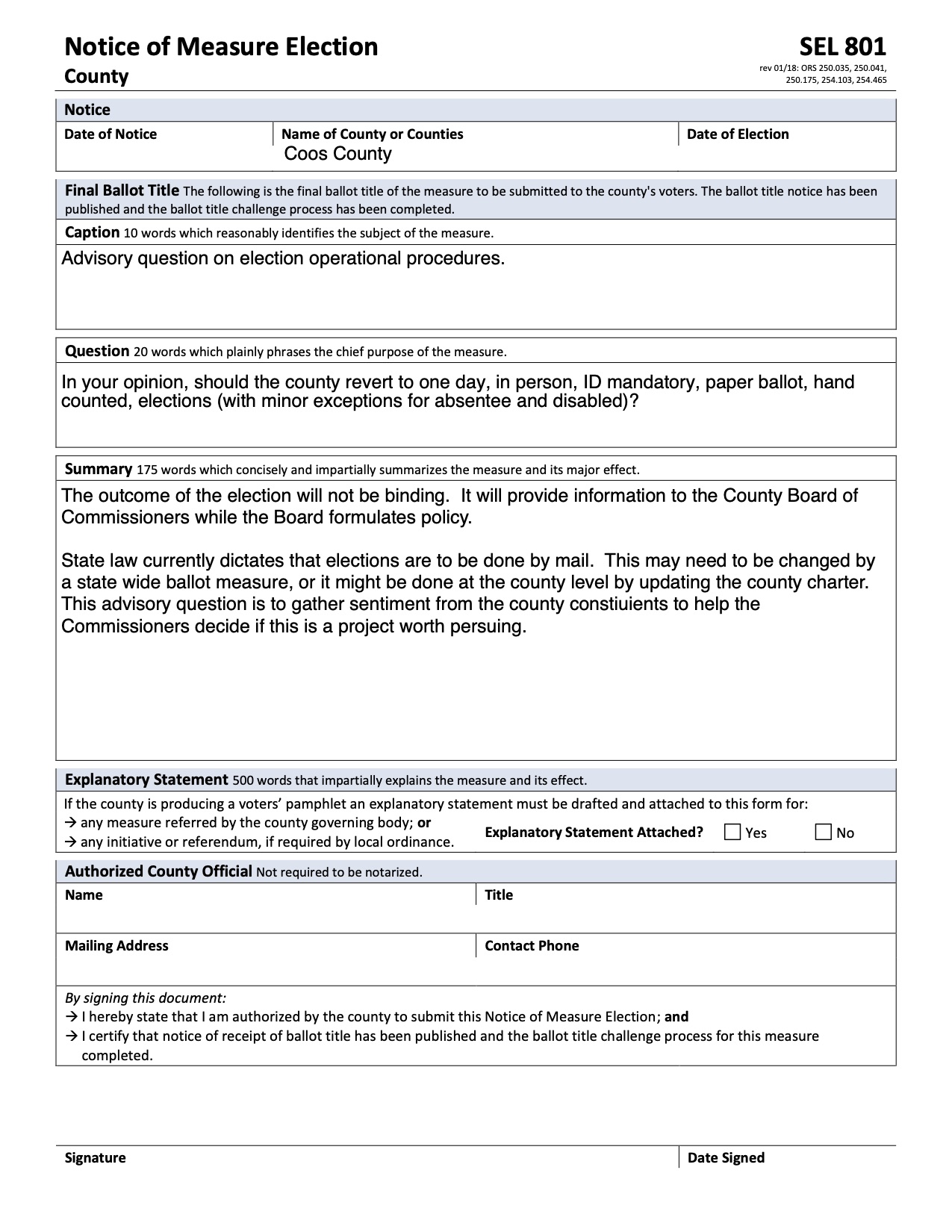
Commissioner Taylor rewrote it slightly after given some feedback about verbiage, and the new version looked like this...
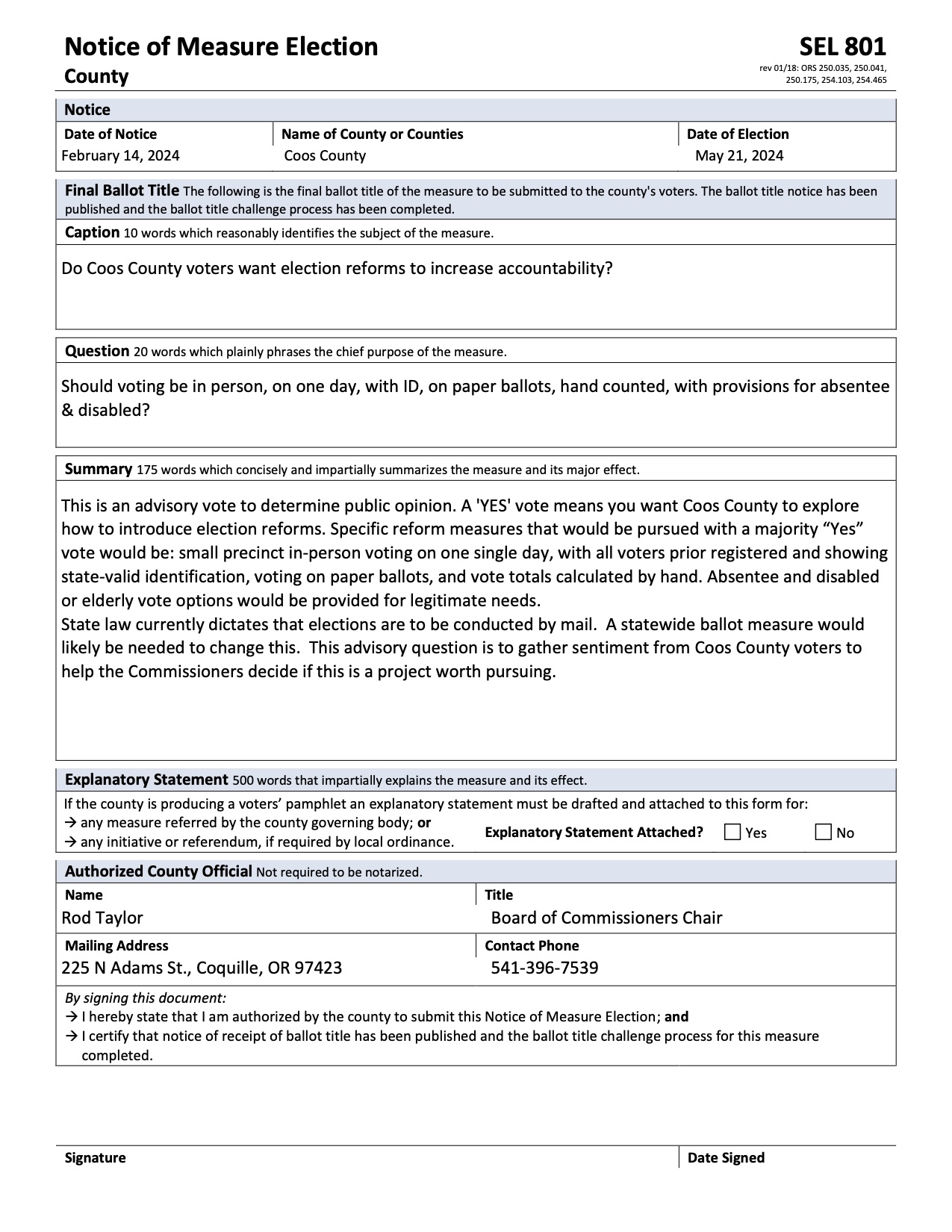
As you can see both versions of this advisory question specifically stipulated that it would not change how elections would be conducted.
Offshore Wind Farms
State Senator David Brock Smith proposed and sponsored a bill to help BOEM (Bureau of Ocean Energy Management) sell offshore leases near Coos Bay and Brookings to install wind farms. While BOEM held "listening sessions" up and down the Coast to get public feedback about these projects, they refused to allow anyone to speak or give feedback.
Commissioner Main did hold a number of work sessions and even conducted a well attended public hearing at the Sawdust Theater in Coquille. A wide array of people from all walks of life showed up; conservatives, liberals, environmentalists, fishing industry workers and representatives, among others. Every single person that wanted to discuss the subject was allowed the time to speak their piece. The sentiment was resoundingly negative against the project. Commissioner Main then went on to issue a Proclamation against the wind farm proposal.
Deciding that every voter in the County should be allowed to give feedback, this advisory measure was proposed...
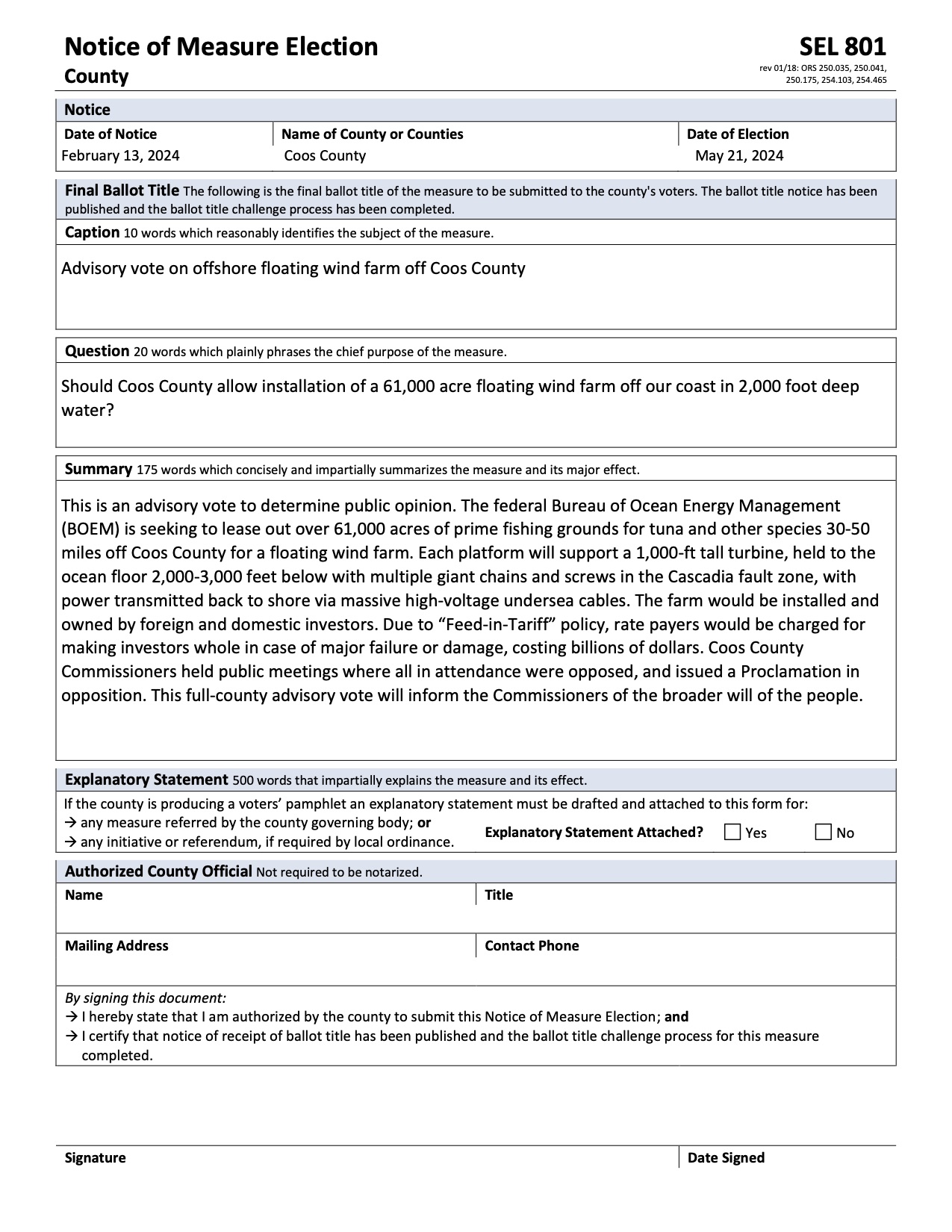
School Choice
This advisory measure, also called the Education Choice For Children measure, was simply a way of asking all voters in Coos County if they think school funding should follow the child.
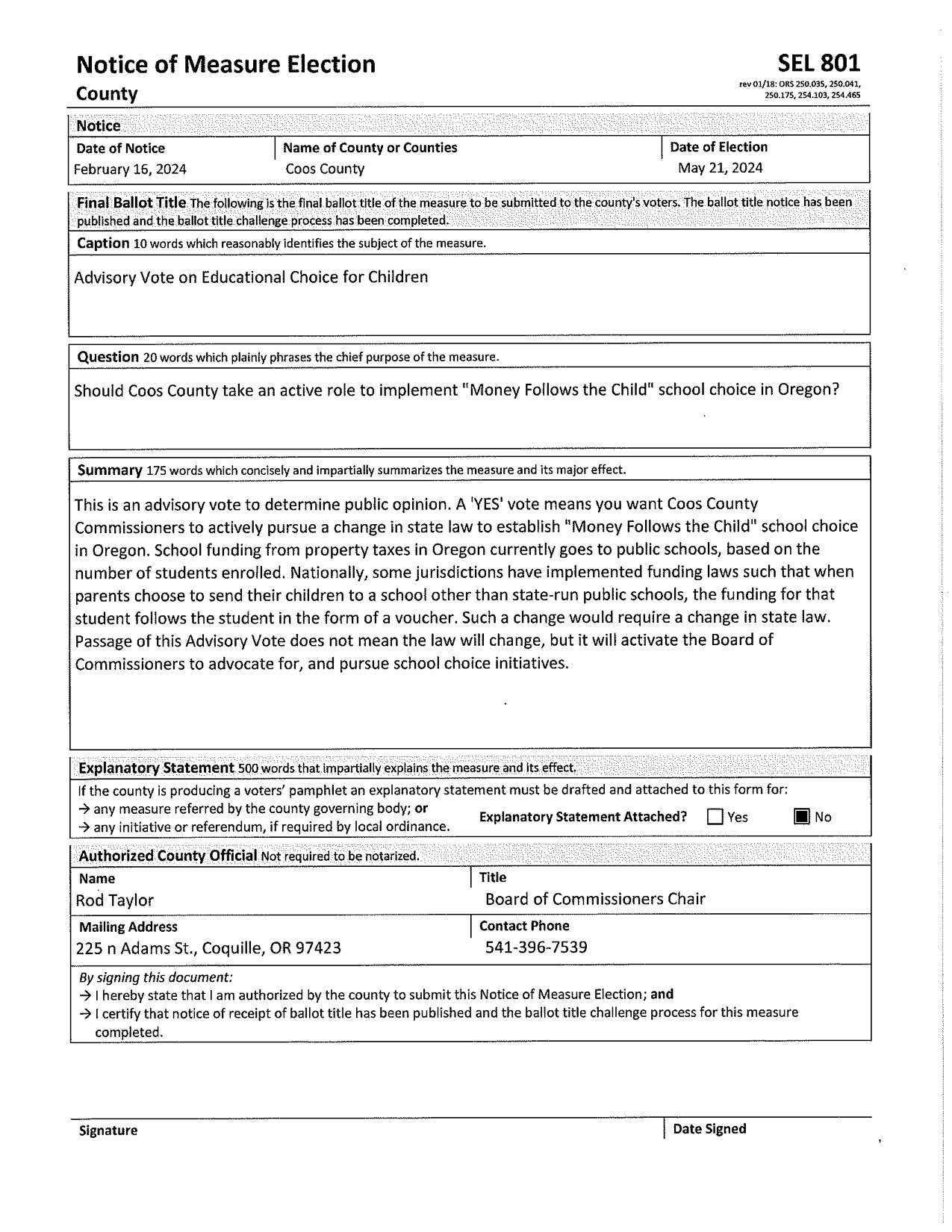
Clerk Appointment
The Clerk, who runs the elections in the County, is elected by the voters in the County. The problem is that the Clerk, once elected, no longer has to do anything the voters, or Commissioners, request and get their marching orders from the Secretary of State in Salem. This advisory measure was an attempt to move the responsibility and reporting back to the constituents the Clerk is supposed to serve.
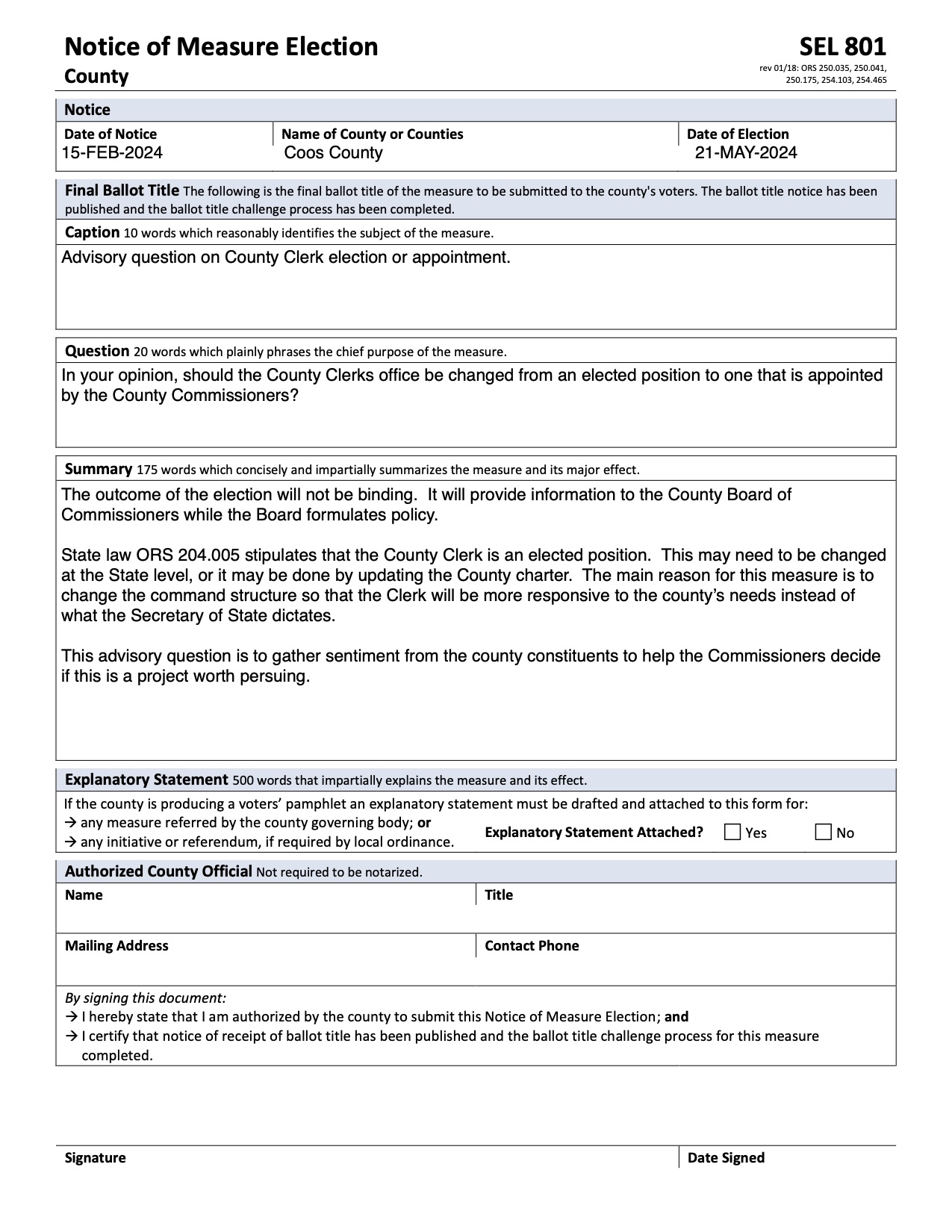
Greater Idaho
Several Counties in Oregon have passed advisory measures to indicate they are interested in looking into the Greater Idaho movement. The Greater Idaho movement is essentially a way for people to assert that they no longer feel that they are being properly represented by their elected officials in Oregon.
For Idaho to annex the Counties in the movement it would take both the Oregon and Idaho legislatures to come to agreements to make this happen. There is very little possibility that this could ever happen, but if enough people respond it might send a strong message. Mimicking the other County advisory measures gave this result...
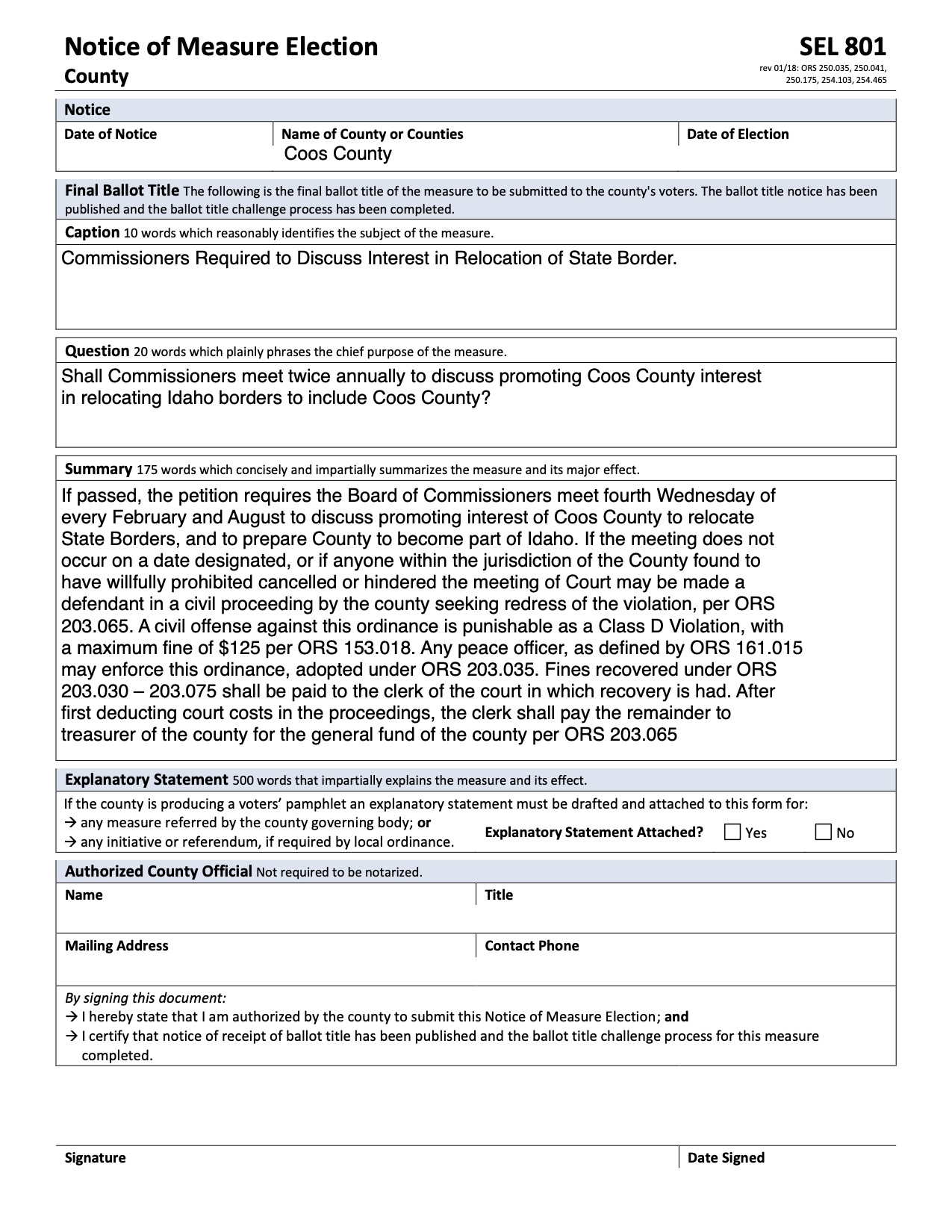
To Reiterate
Every single one of these advisory measures can not change law, add a tax, or immediately change how things are done. They are simply asking ALL the voters in the County their opinion so the Commissioners can use that sentiment to guide their decisions.
Putting Them On The Ballot
The Commissioners decided to vote on putting the Windmill, Election, Clerk and School advisory measures on the ballot during the BOC (Board of Commissioners) Meeting. The Greater Idaho measure was considered a bit too far fetched and might have been a distraction from the other four, so it was left out. They published their agenda for the BOC meeting of February 20th, 2024, twenty-fours hours in advance as required.
The day of the meeting, instead of the usual cadre of a dozen or so people that always show up for these meetings, the room was packed to capacity. These organized protesters were there to disrupt the meeting and shout down the Commissioners. They were no better than the BLM or Antifa goons that are organized to create chaos and wreak havoc. None of their complaints about the proposed advisory measures had any validity as arguments against.
Commissioner Taylor stood his ground, Commissioner Sweet was looking for the closest exit, and Commissioner Main, after two hours of brow beating, decided to call for a vote to table the motions.
Problem is, this was the last opportunity to get these measures on the ballot for the May 2024 primary. The next chance won't happen until November 2024.
Curious Conclusion
Was it that some of these advisory questions challenged the status quo of the Oregon election systems? Is this what brought out the well organized agitators to bully the Commissioners?
Makes one curious.
One thing that is certain is that this a clear case of Voter Suppression. Forty some odd agitators made sure that the voice of 49,000+ voters in Coos County were silenced.
The ill feeling this gave was the basis for the title of this article.